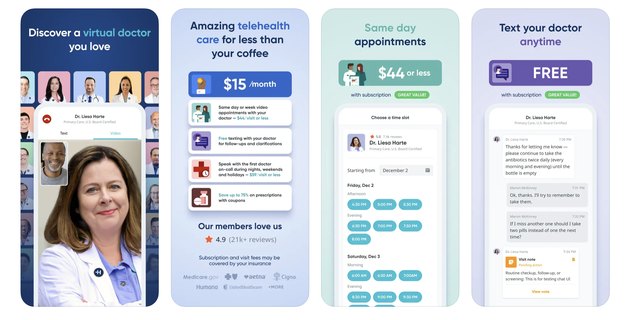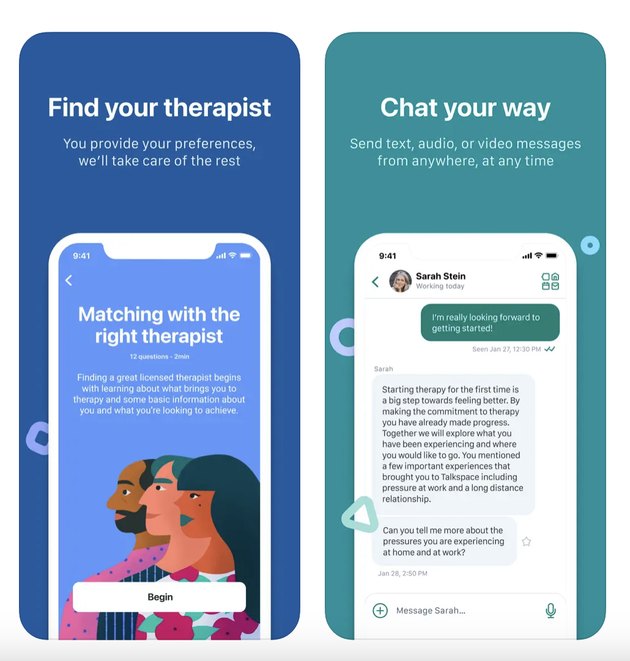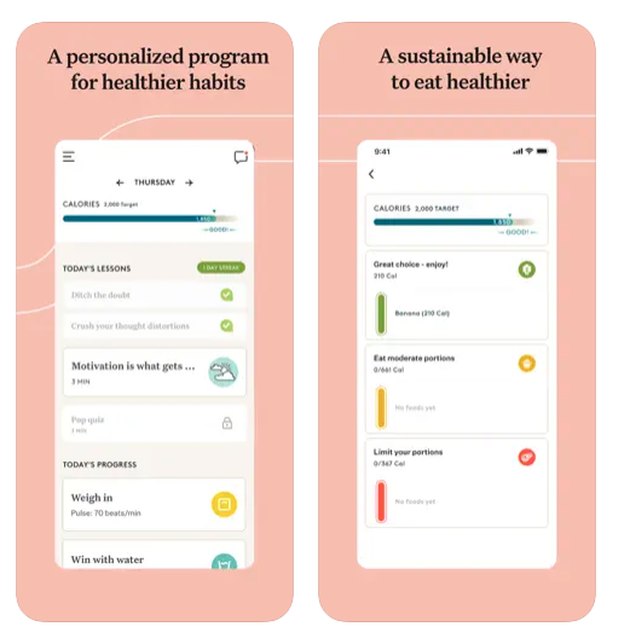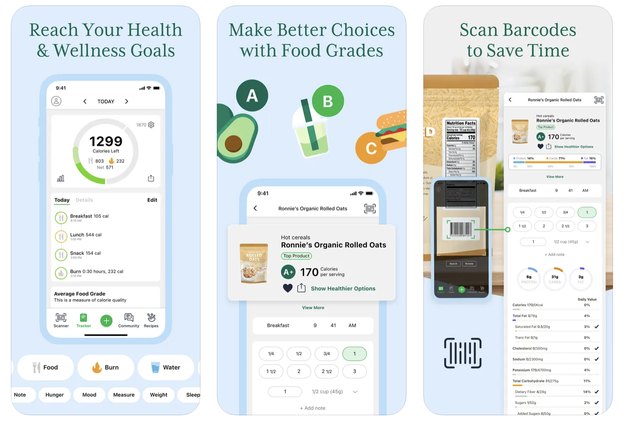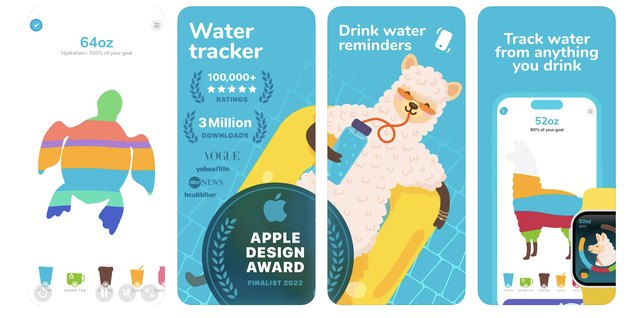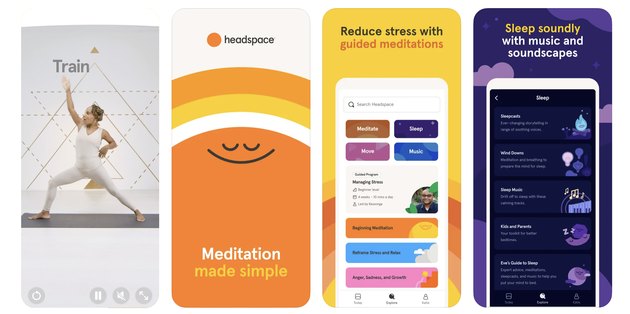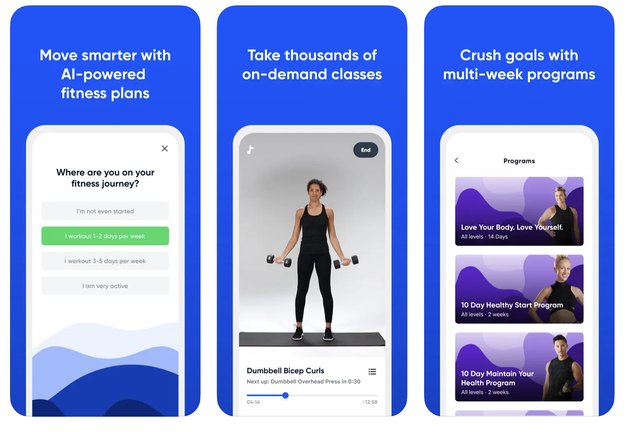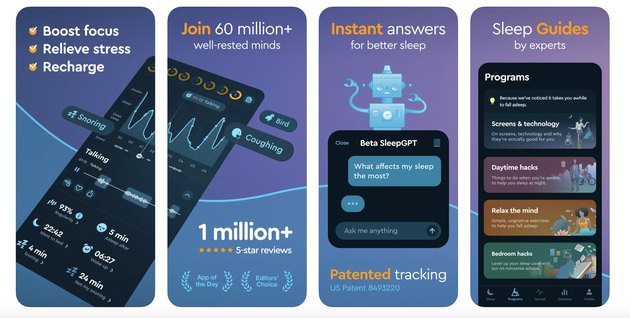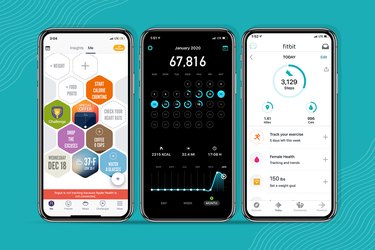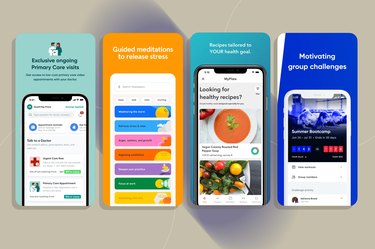
So many of the questions we used to have to take with us when we went to our annual physical we can now answer in the comfort of our homes — or, really, wherever we are — thanks to the plethora of apps at our fingertips.
Of the millions of apps available, health apps are some of the most popular. In fact, October-December 2015 research in JMIR mHealth and uHealth found that as many as 58 percent of people who owned a mobile device had at least one health app.
Video of the Day
Video of the Day
And telehealth may be here to stay, says Vincent Pedre, MD, NYC-based internist and functional medicine doctor, medical director of Pedre Integrative Health and founder of Dr. Pedre Wellness.
"Being able to communicate with your health practitioner on-the-go, check test results and ask questions via a HIPAA-secure platform is no longer an option — it's a necessity," Dr. Pedre says. "From programs that link up to smart bands and watches to monitor heart rate, heart-rate variability and sleep patterns to apps that offer guided meditations, we are only at the tip of the iceberg when it comes to health apps that will help us launch the age of mobile health, where wellness is at our fingertips wherever we go."
No matter the category you're seeking, there's an app for you. Here are some of the best health apps of 2024.
Best Health Apps
- Best Overall: HealthTap (Price varies with subscriptions)
- Best Mental Health App: Talkspace (Starts at $69 per week)
- Best Food App for iPhone: Noom (Starts at $60 per month)
- Best Food App for Android: Fooducate (Prices varies with subscriptions)
- Best Hydration App: Waterllama (Free, with some in-app purchases)
- Best Meditation App: Headspace ($12.99 per month or $69.99 per year)
- Best Exercise App: Aaptiv ($14.99 per month or $99.99 per year)
- Best Sleep App: Sleep Cycle (Free for basic subscription; $39.99 for premium subscription)
How We Chose
Along with tapping experts for their input on what types of apps are helpful, we assessed apps using the following criteria:
- Price
- Features and functionality
- Usability
For more information on how we choose products, click here.
1. HealthTap
If you're an avid Googler of health symptoms and concerns, you'll have a field day with this app that offers you answers to millions and millions of questions from real doctors spanning hundreds of thousands of topics (yes, really).
If you have a question that you can't seem to find an existing answer to on the app, you can post it and a doctor will respond within 24 hours. Need an answer ASAP? You can choose to pay and have an expedited response.
You can also schedule live consultations with doctors, dentists and psychologists; view your lab results and manage your prescriptions.
Download it: iOS | Android; Price: Free to download. With HealthTap Basic, you can pay $99 or less per urgent care visits. HealthTap subscribers (as low as $15 every month) gain access to answers to health questions and can schedule primary care visits for $44 or less and on-demand urgent care visits for $59 along with other features.
2. Talkspace
For many people, one of the biggest hurdles to seeking mental health help is convenience. With a busy schedule, it can be overwhelming to try to fit in time with a mental health professional. Talkspace seeks to make this a non-issue by providing easy access to licensed therapists who are ideal for you and your individual concerns.
It all starts off with a questionnaire that covers your needs, preferences, goals, etc. From there, the app matches you with several therapists and allows you to choose the best fit (or request more options be sent your way).
During each session, you meet in a virtual therapy room that can be accessed straight from your mobile device or your computer's web browser. You can also message your therapist up to five times per week outside of sessions.
3. Noom
Whether you're looking to shed some pounds or simply eat a more nutritious diet, Noom has you covered. The first thing you'll do is fill out a questionnaire that covers the basics: your weight, health goals, lifestyle habits and coaching preferences. Then you'll be matched with a health coach who will work with you to help you reach your goals.
Each day, you'll get a push notification requiring you to do some sort of task, whether it be tracking your meals or doing some form of exercise. After you've gotten in the groove, the app then connects you with like-minded users who you can communicate with for added accountability.
4. Fooducate
There's a lot most of us don't know about the food we eat on a daily basis. Fooducate seeks to educate users on food and nutrition to help them work toward eating a healthy and well-balanced diet.
It's so easy to use — you just scan whatever food it is you're looking to learn more about and the app will share a food score that determines its health and nutrition breakdown along with the pros and cons of that particular food.
5. Waterllama
Staying hydrated just got easier with the Waterllama app. If you have trouble remembering to drink water throughout the day, this app will send you gentle reminders in the form of animated pictures on your phone or smartwatch, soft alarm tones or a combination of both.
You can customize your hydration goals (even participate in challenges), as well as track your intake of other beverages like coffee or alcohol, to help you maintain healthier habits. Plus, it's received more than 100,000 nearly five-star ratings, and was given an Apple Design Award for its cute graphics.
Download it: iOS | Waterllama.com Price: Free; Some in-app purchases available
6. Headspace
Meditation-based health apps have seen a huge surge since the pandemic — and understandably so, because anxiety and depression rates have also skyrocketed since 2020, according to an April 2021 study by the Centers for Disease Control and Prevention.
Meditation is one of the most tried-and-true ways to reduce the mental burdens associated with anxiety, stress and all sorts of mental health issues, Dr. Pedre says.
Luckily, a plethora of meditation apps are helping people cope from the comfort of their homes, and Headspace is one of the most popular, providing guided meditations that are specific to your needs, whether you're looking to amp up your relaxation or soothe yourself to sleep (or both).
Download it: Headspace.com | iOS | Android Price: $12.99 per month or $69.99 per year
7. Aaptiv
This audio-based fitness app brings some serious mojo to your fitness goals thanks to its infusion of heart-pumping music to go along perfectly with whatever workout you're looking to do in addition to audio instructions from a certified personal trainer.
From stretching and treadmill work to outdoor running and indoor cycling, you'll find it all on this app, which you can download to your digital devices and use just about anywhere.
The app tracks your exercise progress, and another perk users love is that it suggests workouts for you based on your fitness level and preferences.
Download it: Aaptiv.com | iOS | Android Price: $14.99 per month or $99.99 per year
8. Sleep Cycle
If you're someone who wakes up feeling less than fully rested even after you've slept a healthy amount of hours at night, a sleep app may be beneficial for you.
Sleep Cycle is one of the most popular, mainly because of its user-friendly interface and advanced insight into sleep trends both in the short and long term. In addition to measuring your quality of sleep, sleep patterns and any disruptions that may have occurred throughout the night, the app also measures your heart rate, which helps clue you into what might be holding you back from optimal daytime energy.
Best part? All of the tracking is done without any wearable device — just make sure your phone is placed next to your bedside and you're good to go.
Download it: SleepCycle.com | iOS | Android Price: Free for basic membership; $39.99 per year for premium membership
What to Look for in a Health App
Keep these four things in mind when shopping the app store:
1. Fits Your Goals
The first thing you want to do when considering a health app is take an inventory of your health goals to determine how the app can help you reach them.
"For example, if you are having trouble sleeping, then checking out the health applications specifically for sleep would be beneficial," suggests Monisha Bhanote, MD, integrative medicine doctor and founder and CEO of Holistic Wellbeing Collective. "If you are focused on increasing your physical activity, then an exercise tracker may be what you need to keep you accountable."
2. Offers Actionable Information
It's also important to check that the app is using evidence-based strategies. While health apps can be incredibly informative and give you some additional tools to help you take control of your health, make sure you're not just downloading and following any old app.
Ask yourself whether the information you are getting is "actionable intelligence" and will actually be able to improve your health in some way, recommends Joseph Feuerstein, MD, director of integrative medicine at Stamford Hospital and associate professor of clinical medicine at Columbia University.
"For example, an app that continually follows your skin temperature and how it may vary during the day is probably not that useful, whereas one that is looking at your heart rate and rhythm can potentially identify an abnormal rhythm and would be very useful — and potentially life-saving," he says.
3. Is Easy to Use
An app you don't use is as useful to you as one you never downloaded in the first place, so make sure it's relatively simple to use. A good way to check? Read reviews, and look for apps that offer free trials so you can take them for a test run before committing.
4. Fits Your Budget
Many health apps are free to download but then require in-app purchases to use many of the features. Make sure the cost of the features you're looking for works for your wallet before you hit the download button.
Was this article helpful?
150 Characters Max
0/150
Thank you for sharing!
Thank you for your feedback!
Is this an emergency? If you are experiencing serious medical symptoms, please see the National Library of Medicine’s list of signs you need emergency medical attention or call 911.
